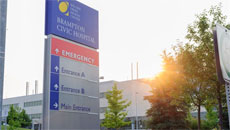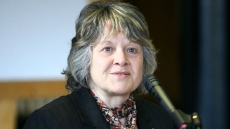OTTAWA - Canada is sending a second mobile laboratory and the team to run it to West Africa in an effort to battle the Ebola outbreak, Health Minister Rona Ambrose announced Saturday.
Job 1 for the new team will be to help Medecins Sans Frontieres — Doctors Without Borders — figure out if cleaning techniques at treatment centres need to be stepped up to prevent infection of health-care workers.
An unusual feature of this outbreak has been that health-care workers have continued to become infected even after MSF treatment centres — renown for their stringent protocols for protecting medical staff — have been opened.
In the past, health-care workers were hard hit in the early days of an outbreak, before it was realized that Ebola was spreading in the affected community. But once MSF got up and running, in previous outbreaks those infections then ceased.
The World Health Organization said Friday that as of Oct. 1, 382 health-care workers have contracted Ebola and 216 have died from the disease.
Dr. Gregory Taylor, the head of the Public Health Agency of Canada, said the second lab team, which consists of two people, will do testing in the treatment centre at Kailahun, Sierra Leone, to see if health-care workers may be becoming infected by coming in contact with the virus on inadequately cleaned surfaces.
"In the wards, they (MSF) are concerned about potential other mechanisms of transmission so we'll be doing some sampling from sinks, floors, all that kind of stuff," Taylor told The Canadian Press in an interview.
The lab team will also monitor the effectiveness of infection prevention procedures at handwashing stations and disposal sites.
Taylor said this is the first time the Public Health Agency of Canada has had two mobile labs in the field at the same time to work on a single outbreak. The first team is providing diagnostic services for the MSF Kailahun treatment centre. Canada has had rotating teams of scientists at Kai since June.
He said once the environmental testing work is done the team will be deployed to another location, likely also in Sierra Leone, to do rapid diagnostic testing. Taylor said this lab is "ultra mobile."
"This one is designed to be moved quickly and the staff know that," he said. "So they're going to start in Kailahun with the current team, they're going to do the environmental sampling and then they're going to be able to move where it's needed."
"We're going to let the WHO, let the UN, let folks know that this will move wherever it needs to go."
One of the people who will be in Sierra Leone is Dr. Gary Kobinger, head of special pathogens at the National Microbiology Laboratory. Kobinger, who did a stint in Sierra Leone in the summer, has been in the Democratic Republic of Congo helping the national laboratory there with its Ebola testing techniques. That country has been undergoing a separate, much smaller Ebola outbreak which appears to be coming under control.
The mobile lab concept, which Canada pioneered, has substantially sped up the process of figuring out who is sick in an Ebola outbreak so that they can be isolated from the healthy. That is the only way to arrest transmission of the disease.
In the early stages of Ebola infection, symptoms are like those of a number of other illnesses, such as malaria, that are common in countries where Ebola outbreaks occur.
Taylor acknowledged the extraordinary size of this outbreak — which is expected to last for months — is stretching resources. Teams can only be kept in the field for a few weeks, for their safety. And the National Microbiology Laboratory plays a critical role in Ebola research, which must continue.
Taylor said the national lab is looking at drawing on the expertise of staff of other federal government laboratories, as well as provincial laboratories across the country. He said there is even talk with the United Kingdom of putting together joint teams to go out into the field.
This is by far the largest Ebola outbreak the world has ever seen. The most recent case count from the WHO places to known cases (confirmed, probable and suspected) at nearly 7,500 and the death toll at more than 3,400. No previous Ebola outbreak had ever involved more than 450 cases.





